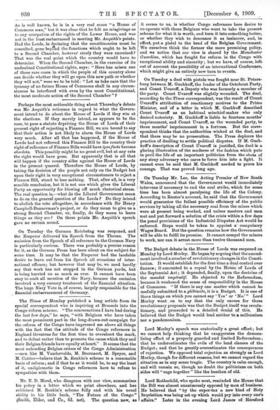Perhaps the most noticeable thing about Thursday's debate was Mr.
Asquith's reticence in regard to what the Govern- ment intend to- do about the House of Lords if they win at the elections. If they merely intend, as appears to be the case, to pass a statute depriving the House of, Lords of their present right of rejecting a Finance Bill, we are bound to say that their action is not likely to alarm the House of Lords very much. After all that has happened, if the House of Lords had not referred this Finance Bill to the country their right of reference of Finance Bills would have ipso facto become obsolete. This possibly might be no great evil, but at any rate the right would have gone. But apparently that is all that will happen if the country sides against the House of Lords in the present quarrel. Therefore the House of Lords, by taking the decision of the people not only on the Budget but upon their right in very exceptional circumstances to reject a Finance Bill, stand to lose nothing. That, after all, is a very sensible conclusion, but it is not one which gives the Liberal Party an opportunity for blowing off much rhetorical steam. The real question is,—what do the Liberal Government mean to do on the general question of the Lords P Do they intend to abolish the veto altogether,. in accordance with Sir Henry Campbell-Bannerman's project, or do they mean to give us a strong Second Chamber, or, finally, do they mean to leave things as they are ? On these points Mr. Asqnith's speech gave no certain sound.






































































 Previous page
Previous page